 Petzlover
Petzlover Australian Kelpie is originated from Australia but Beagle-Harrier is originated from France. Both Australian Kelpie and Beagle-Harrier are having almost same height. Both Australian Kelpie and Beagle-Harrier are having almost same weight. Australian Kelpie may live 3 years more than Beagle-Harrier. Australian Kelpie may have less litter size than Beagle-Harrier. Both Australian Kelpie and Beagle-Harrier requires Moderate Maintenance.
Australian Kelpie is originated from Australia but Beagle-Harrier is originated from France. Both Australian Kelpie and Beagle-Harrier are having almost same height. Both Australian Kelpie and Beagle-Harrier are having almost same weight. Australian Kelpie may live 3 years more than Beagle-Harrier. Australian Kelpie may have less litter size than Beagle-Harrier. Both Australian Kelpie and Beagle-Harrier requires Moderate Maintenance.
 The energetic Kelpie came into being around 1870, with this working dog breed having a role to play with the herding of sheep in the harsh Australian outback.The sheep and wool industry in Australia has always been big business, and Australian ranchers were looking for a tough dog that could cope with sheep but also cope with the harsh environment.
The energetic Kelpie came into being around 1870, with this working dog breed having a role to play with the herding of sheep in the harsh Australian outback.The sheep and wool industry in Australia has always been big business, and Australian ranchers were looking for a tough dog that could cope with sheep but also cope with the harsh environment.
These are adaptable dogs too and their ancestors include the Coley or Collie, a British herding-type dog, the English- and the Australian Shepherd and the Dingo. In fact it is believed that up to 4% of their genes comes from the Dingo. These adaptable dogs were also brought to North America where they quickly adapted to the different climate and different livestock.
The Australian Kelpie isn’t your regular pet as they are essentially an outdoor, working dog. They are recognized today by the United Kennel Club and registered by the North American Australian Kelpie Registry.
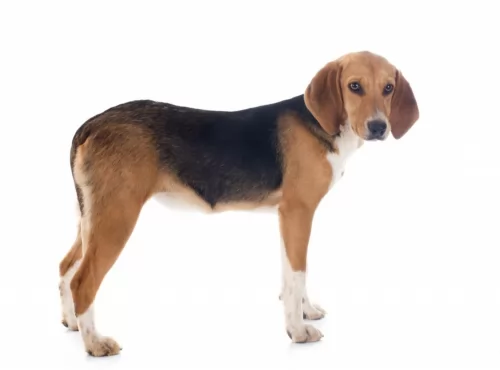 The Beagle Harrier, the breed that was made mixing the France Scent Hounds and a Beagle.
It is not quite sure if this breed was made on purpose or the mix of the breeds happened and resulted in a great dog so the breeding continued.
Since they are not large dogs as hounds, they are used to hunt small animals.
The Beagle Harrier, the breed that was made mixing the France Scent Hounds and a Beagle.
It is not quite sure if this breed was made on purpose or the mix of the breeds happened and resulted in a great dog so the breeding continued.
Since they are not large dogs as hounds, they are used to hunt small animals.
This first breeding took place in England, but after the 14th century, they were breed on purpose in France.
 The Kelpie is a medium-sized dog with a coat that comes in a number of colours – black, chocolate, fawn, red, blue, tan, white and gold. . The nose colour blends in with the dog’s coat colour and can be black, brownish and even pinkish.
The Kelpie is a medium-sized dog with a coat that comes in a number of colours – black, chocolate, fawn, red, blue, tan, white and gold. . The nose colour blends in with the dog’s coat colour and can be black, brownish and even pinkish.
The Kelpie has a medium-length tail which is low-set. The ears are pricked, giving the dog an intelligent, alert appearance. The dog’s head is also narrow and long, and his eyes are bright and inquisitive.
The Australian Kelpie has an athletic appearance, with a body which is longer than their height, similar to that of a German Shepherd. Because the Australian Kelpie is such an energetic, active breed, he’ll need plenty of ‘jobs to do’, lots of ball games and other exercise to keep him free from boredom and to ensure he maintains his lithe, lean, muscular limbs.
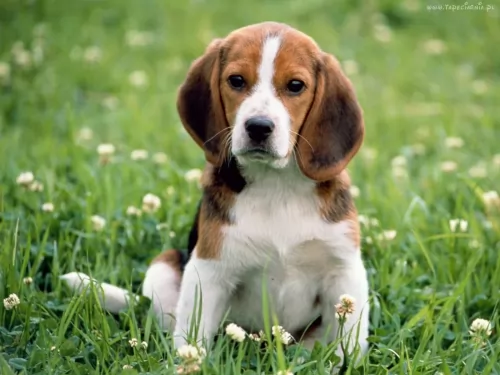 The Beagle Harrier is a scent hound that is described as a big sized Beagle or a small sized Harrier. This breed was developed from this two breeds, actually. Despite the looks of these breeds, the Beagle Harrier is an energetic kind of dog who gets very attached to his family. This medium sized pet comes in variations of colours and they are usually tricoloured. They usually have dark coloured eyes, white paws, and They usually grow up to have a very muscular body, but, if you don’t provide them with the daily activity they need, they will quickly get obese and unhappy.
The Beagle Harrier is a scent hound that is described as a big sized Beagle or a small sized Harrier. This breed was developed from this two breeds, actually. Despite the looks of these breeds, the Beagle Harrier is an energetic kind of dog who gets very attached to his family. This medium sized pet comes in variations of colours and they are usually tricoloured. They usually have dark coloured eyes, white paws, and They usually grow up to have a very muscular body, but, if you don’t provide them with the daily activity they need, they will quickly get obese and unhappy.
 The Australian Kelpie is an active, busy, intelligent, loving breed who is highly protective of his human family. He gets on well with children and other pets in the home but you’ll want him trained if you want him to be gentle around children and smaller pets. He does tend to gravitate towards one particular family member as his ‘favourite’ though.
The Australian Kelpie is an active, busy, intelligent, loving breed who is highly protective of his human family. He gets on well with children and other pets in the home but you’ll want him trained if you want him to be gentle around children and smaller pets. He does tend to gravitate towards one particular family member as his ‘favourite’ though.
Your Kelpie won't do well in an apartment as he is a working dog who wants plenty of place to run and play. If he is bored, it manifests itself with constant barking. Make sure to provide a stimulating, active lifestyle for your Australian Kelpie, provide him with everything a dog needs and you’ll be rewarded with a devoted and loyal companion.
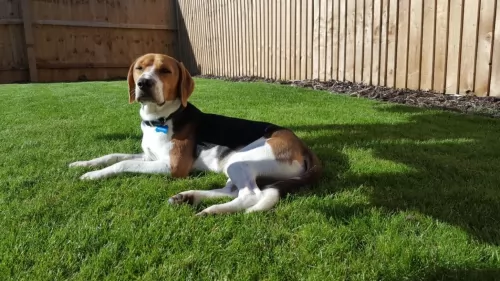 The Beagle Harrier, if trained properly and socialized while he was still a pup, will be the great playmate for any child. They get along with strangers, as well. We might say that they will get along with anybody who is ready to run and play with him. Children are most likely that kind of playdate, so it appears that they like children more. The Beagle Harrier is a great family pet, and he is great with babies, toddlers, teenagers… so don’t be afraid to leave the dog alone during the playdate!
The Beagle Harrier, if trained properly and socialized while he was still a pup, will be the great playmate for any child. They get along with strangers, as well. We might say that they will get along with anybody who is ready to run and play with him. Children are most likely that kind of playdate, so it appears that they like children more. The Beagle Harrier is a great family pet, and he is great with babies, toddlers, teenagers… so don’t be afraid to leave the dog alone during the playdate!
hunting, scent tracking, search dog
Some will say that the Beagle Harrier is one of the most desirable pets because of his loving and lively nature. They get along with almost anyone and they don’t mind living indoors if you have the time to take him out for a daily run each day. They will do great in a large group of people and any public places so you can take your Beagle Harrier with you anywhere you go.
Since the Beagle Harrier is placed in a group of the hound dogs, you must be aware that he will have the attitude of the pack leader. Once you got the Beagle Harrier puppy, you must start training and socializing him in order to grow the pet that will be easy to handle and accepted by the family and all the people around you, even strangers. They are very intelligent and they have a calm nature so they will be quite easy to train.
 Your Australian Kelpie is a hardy breed and you won’t find many health problems with him. Yes, every dog is susceptible to illnesses which are common with all dog breeds, and these are illnesses such as hip dysplasia and cryptorchidism.
Your Australian Kelpie is a hardy breed and you won’t find many health problems with him. Yes, every dog is susceptible to illnesses which are common with all dog breeds, and these are illnesses such as hip dysplasia and cryptorchidism.
You will need to check your Kelpie out for eye disease such as PRA or Progressive Retinal Atrophy, a group of genetic diseases which are found in some breeds of dogs. This can lead to cataracts and blindness.
Health problems in your Australian Kelpie can certainly be partially prevented by the way you feed your dog and by the environment you provide him with. Every dog has the potential to develop genetic health problems, but as we’ve said, the Kelpie is a generally healthy breed.
Always find a reputable breeder whose focus is on breeding healthy dogs and who can provide certification that the parents of the dog are clear of defects and are in tip-top condition for breeding.
Along with quality food and fresh water, getting your puppy vaccinated is hugely important. Australian Kelpie puppy shots will protect your new 4-legged family member from the likes of distemper, parvovirus and hepatitis. Your puppy will also need additional booster vaccinations after his first shots which start at around 8 weeks of age.
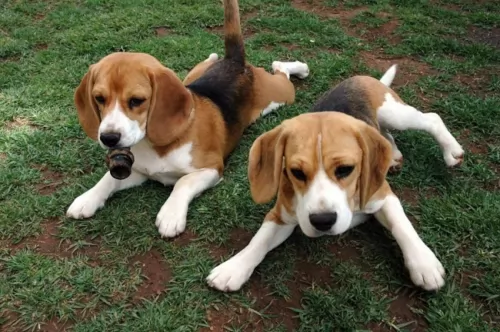 Almost every active dog suffers from joint diseases. Even though it’s generally a genetic disease, you can lower the chances of hip or elbow dysplasia by taking care of your dog’s weight, diet and daily exercise.
Almost every active dog suffers from joint diseases. Even though it’s generally a genetic disease, you can lower the chances of hip or elbow dysplasia by taking care of your dog’s weight, diet and daily exercise.
The Beagle Harrier has big ears that are always set down. That makes them ideal for the dirt accumulation, ear irritations and ear infections. Check his ears regularly and clean them at least once a week.
 Australian Kelpies are low maintenance and their coat is easy to groom and maintain. You want to give him a good brush twice a week to get rid of loose hair. Australian Kelpies are moderate shedders.
Australian Kelpies are low maintenance and their coat is easy to groom and maintain. You want to give him a good brush twice a week to get rid of loose hair. Australian Kelpies are moderate shedders.
It is important to get your puppy off on the right foot to avoid health problems later on. Homemade dog food which includes chicken, rice and vegetables is always the best food for your dog. If you can't prepared your own meals for your Kelpie, top grade commercial dog food brands are recommended.
When looking at dog foods, remember that your Kelpie is a working dog – a naturally active breed and you’ll need to look at dog food which has been specially formulated for active dogs. Every dog will need raw meat in their diet if you want to avoid a dog with an itchy, flaky skin, a dog with poor energy levels and a dog that has no resistance to infection.
Every owner who cares for their dog will provide him with socialization and training. The Australian Kelpie is an intelligent breed who responds well to training.
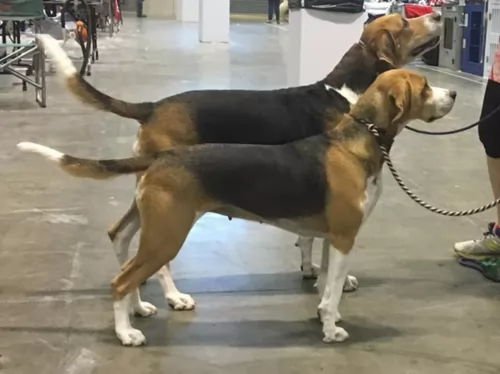 Since the Beagle Harrier is an active dog breed, they will need food for the active dogs. Make sure you provide them with quality food that will give them enough strength to get through the very active day, and not gain too much of the weight. It is very important that you don’t overfeed him because this breed quickly becomes obese. It is advisable to use treats while you train him to do new tricks, but be very careful with the amount you give to the dog.
Since the Beagle Harrier is an active dog breed, they will need food for the active dogs. Make sure you provide them with quality food that will give them enough strength to get through the very active day, and not gain too much of the weight. It is very important that you don’t overfeed him because this breed quickly becomes obese. It is advisable to use treats while you train him to do new tricks, but be very careful with the amount you give to the dog.
Puppies need to be fed only two times a day. Once you decide which brand of food you will use, stick with them until the dog is 6 months old. Make sure they have enough nutrients and the quality ingredients that will help them with growing strong and healthy bones.
If you want Beagle Harrier to grow up in a happy and healthy dog, make sure you provide him with quality food, lots of exercises and unconditional love. They are extremely loving and they get depressed if left alone. Grooming tips are very clear – they need a regular brush because shed a lot. The more you brush, the less hair you will find on your hands during the belly rubs.
If your Beagle Harrier is trained and socialized, the dog park will be the best daily activity for him. If there is no dog park near your house, take him to the bike ride, jogging, swimming, hiking, markets, parks… They love to be off the leash and with people but since they are the hound dogs, don’t be surprised if they get distracted by smelling something more interesting than the ball. They would love to grow up in a house with a large yard, but, if you live in the apartment, make sure that you take time for his daily activity.